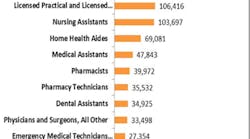The 10 hardest-to-fill health care jobs of tomorrow include dental assistants
An article by Bob Nelson that appeared on thehiringsite.careerbuilder.com generated a lively a discussion on LinkedIn.
He wrote, “The struggle to fill health care jobs is an ongoing battle for recruiters and hiring managers in the health care industry. Sixty percent of employers say the inability to fill health care jobs has had a negative financial impact, and 20% feel they lack the resources necessary to deal with the demans of an aging population shift..
“In an effort to shed light on the growing health care skills gap, CareerBuilder used data from Economic Modeling Specialists, Intl. (EMSI) to compile a list of health care jobs projected to have the greatest gap in employment to job openings from now until 2018.” Copyright CareerBuilder, LLC - Reprinted with permission.
As demonstrated by the chart, dental assistants rank No. 8 in hardest to fill health care jobs of the future.
Top 10 Health Care Occupations With Worker Shortages (2013-2018)
A discussion started by Kathy Peikert, PHR, generated quite a few comments about the profession and its required training from a variety of professionals in the dental field. The discussion immediately jumped into the training of dental assistants. Following are some of the highlights of the comments. (To join the discussion, join a Dental Speakers, Dental, Dental Practice Management, or Dental Educators group on LinkedIn and search for Kathy Peickert.)
Michael Lewis, president at M.R. Lewis, DMD, said, “I’ve trained all of my chairside assistants. Most hand skills can be taught. Teaching a RDH is also very easy. Behavioral skills are more difficult to teach, and are at least as important, if not more so, than the technical skills.”
Terry Yacovitch, DDS, owner of Yacovitch Dental in Montreal, said, “Here in Quebec, 90+% of assistants are certified via an in depth training program... Most are members of their own association that provides specific advanced education on all facets of current and emerging dentistry. Clinics that employ non-certified assistants have come under close scrutiny. Any clinical procedures done by non-certified personnel have led to those dentists being "punished" severely. If ever a problem that goes to court ...the assistant’s association will not defend that dentist because he or she knowingly had non-certified support staff performing services that they have not been properly trained for via a recognized program.”
Colleen Mee, Dental Chair, Lead Dental Assisting Faculty at Ross Education, LLC, said, “Employing a trained, qualified dental assistant can certainly be a challenge in some areas. Having credentialed staff really seems to be becoming the standard of care... An educated DA has so much more to offer a dental practice. It’s well worth the additional expense to hire one.”
Deborah Stewart,business consultant and coach, said, “Technology is constantly changing. Some dentists can train staff members in technology and others can't because they’re so busy. The public is requesting that people have more training in schools, and I agree. For instance, new laser technology for dental hygienists involving periodontal attachment requires a person to graduate from an accredited school. Assistants need independent third party school feedback to concur the skills taught are the skills learned. Education on sterilization needs to be standard in school, because from personal experience working in dentistry for 45 years, sterilization information and techniques suffer, and just because one dentist knows proper protocol does not mean another dentist knows or shares the information. A case in point is the Oklahoma oral surgeon who was reusing needles. Schools reinforce the same education so people can learn protocol and not following that protocol affects public safety. Thousands of dentists teaching in their offices without formal training in schools will only confuse the educational system and allow for many improperly trained assistants and hygienists.”
Teri Hansen, a clinic supervisor at Eastern Washington University, said, “I believe ALL dental assistants should have formal training. Hopefully this this would raise awareness as to our important contributions to the dental practice, as well as to patient safety. I’m proud to be a CDA.”
Barbara Rosenzweig of Dental People & Med People, Inc., said, “I truly believe that people need to go through an accredited dental assisting program. Not only depending on the laws in your state (which most require) I would use that as a marketing tool to attract new patients by bragging about the skills of the practice’s employees. At my dental staffing agency, we interview and place RDAs. Anyone that hires either temporary or permanent assistants from us knows the assistants are educated and professionally trained in the field. Patients will appreciate and respect dental offices for this.”
------------------------------------------------------------
RELATED ARTICLES:
Dental assistants believe certification issues affect salaries
Shortage of dentists widens access to care
------------------------------------------------------------








